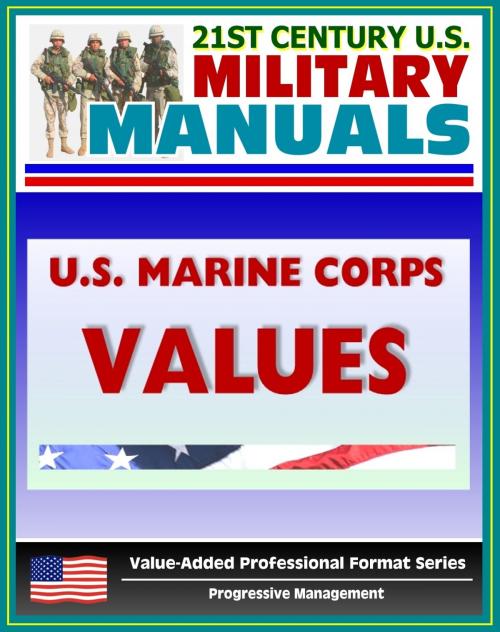21st Century U.S. Military Manuals: U.S. Marine Corps (USMC) Marine Corps Values: A User's Guide for Discussion Leaders (Value-Added Professional Format Series)
Nonfiction, History, Military, Naval| Author: | Progressive Management | ISBN: | 9781465852168 |
| Publisher: | Progressive Management | Publication: | February 17, 2012 |
| Imprint: | Smashwords Edition | Language: | English |
| Author: | Progressive Management |
| ISBN: | 9781465852168 |
| Publisher: | Progressive Management |
| Publication: | February 17, 2012 |
| Imprint: | Smashwords Edition |
| Language: | English |
Part of our value-added professional format series of U.S. military manuals, this U.S. Marine Corps manual is to be used as a tool to help ensure that the values of the Corps continue to be reinforced and sustained in all Marines after being formally instilled in entry level training. This document is a compendium of discussion guides developed and used by Marine Corps formal schools. The guides are part of the formal inculcation of values in young Marines, enlisted and officer, during the entry level training process. This guide is designed to be used as a departure point for discussing the topics as a continuation of the process of sustaining values within the Marine Corps.
The User's Guide also serves as a resource for leaders to understand the "talk" and the "walk" expected of them as leaders. New graduates of the Recruit Depots and The Basic School have been exposed to these lessons and expect to arrive at their first duty assignments and MOS schools to find these principles and standards exhibited in the Marines they encounter. Leaders must remember that as long as there is but one Marine junior to them, they are honor bound to uphold the customs and traditions of the Corps and to always "walk the walk and talk the talk." We are the "parents" and "older siblings" of the future leaders of the Marine Corps. America is depending on us to ensure the Marines of tomorrow are ready and worthy of the challenges of this obligation.
Teaching, reinforcement, and sustainment of these lessons can take place in the field, garrison, or formal school setting. Instructional methodology and media may vary depending on the environment and location of the instruction. However, environment should not be considered an obstacle to the conduct or quality of the instruction. This guide has been developed as a generic, universal training tool that is applicable to all Marines regardless of grade. Discussion leaders should include personal experiences that contribute to the development of the particular value or leadership lesson being discussed.
As a bonus, this reproduction includes the Marine Corps Manual, the basic publication of the United States Marine Corps issued by the Commandant of the Marine Corps and approved by the Secretary of the Navy. It is a regulatory publication for the Department of the Navy as defined in U.S. Navy Regulations. The Marine Corps Manual is designed primarily for use by Marine Corps commanders and their staffs, Navy officers exercising command over Marines, the staff of the Commandant of the Marine Corps, and the staffs of the bureaus and offices of the Navy Department. Contents: Chapter 1 - General Administration And Management * Chapter 2 - Manpower * Chapter 3 - Operations And Readiness * Chapter 4 - Logistics
Part of our value-added professional format series of U.S. military manuals, this U.S. Marine Corps manual is to be used as a tool to help ensure that the values of the Corps continue to be reinforced and sustained in all Marines after being formally instilled in entry level training. This document is a compendium of discussion guides developed and used by Marine Corps formal schools. The guides are part of the formal inculcation of values in young Marines, enlisted and officer, during the entry level training process. This guide is designed to be used as a departure point for discussing the topics as a continuation of the process of sustaining values within the Marine Corps.
The User's Guide also serves as a resource for leaders to understand the "talk" and the "walk" expected of them as leaders. New graduates of the Recruit Depots and The Basic School have been exposed to these lessons and expect to arrive at their first duty assignments and MOS schools to find these principles and standards exhibited in the Marines they encounter. Leaders must remember that as long as there is but one Marine junior to them, they are honor bound to uphold the customs and traditions of the Corps and to always "walk the walk and talk the talk." We are the "parents" and "older siblings" of the future leaders of the Marine Corps. America is depending on us to ensure the Marines of tomorrow are ready and worthy of the challenges of this obligation.
Teaching, reinforcement, and sustainment of these lessons can take place in the field, garrison, or formal school setting. Instructional methodology and media may vary depending on the environment and location of the instruction. However, environment should not be considered an obstacle to the conduct or quality of the instruction. This guide has been developed as a generic, universal training tool that is applicable to all Marines regardless of grade. Discussion leaders should include personal experiences that contribute to the development of the particular value or leadership lesson being discussed.
As a bonus, this reproduction includes the Marine Corps Manual, the basic publication of the United States Marine Corps issued by the Commandant of the Marine Corps and approved by the Secretary of the Navy. It is a regulatory publication for the Department of the Navy as defined in U.S. Navy Regulations. The Marine Corps Manual is designed primarily for use by Marine Corps commanders and their staffs, Navy officers exercising command over Marines, the staff of the Commandant of the Marine Corps, and the staffs of the bureaus and offices of the Navy Department. Contents: Chapter 1 - General Administration And Management * Chapter 2 - Manpower * Chapter 3 - Operations And Readiness * Chapter 4 - Logistics















